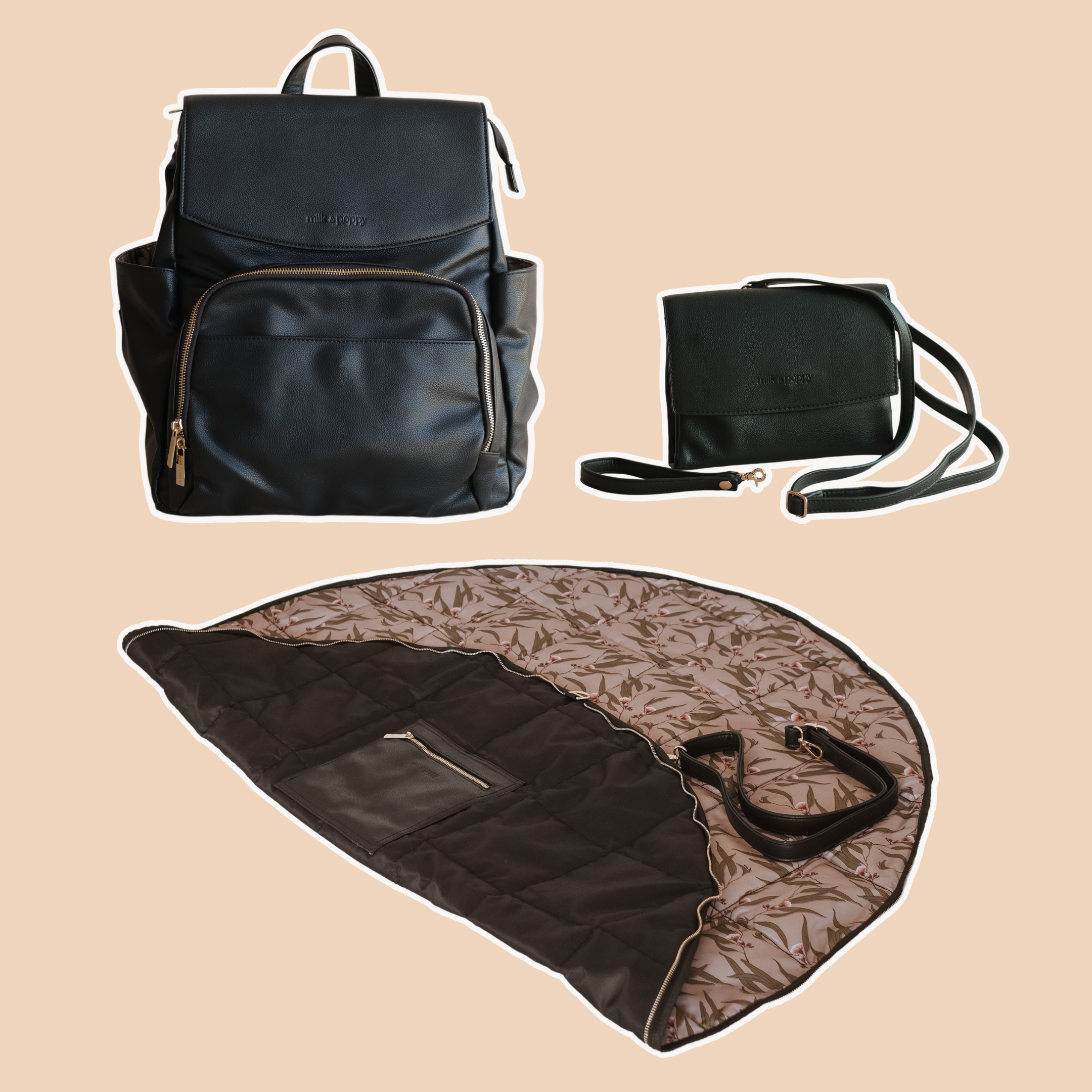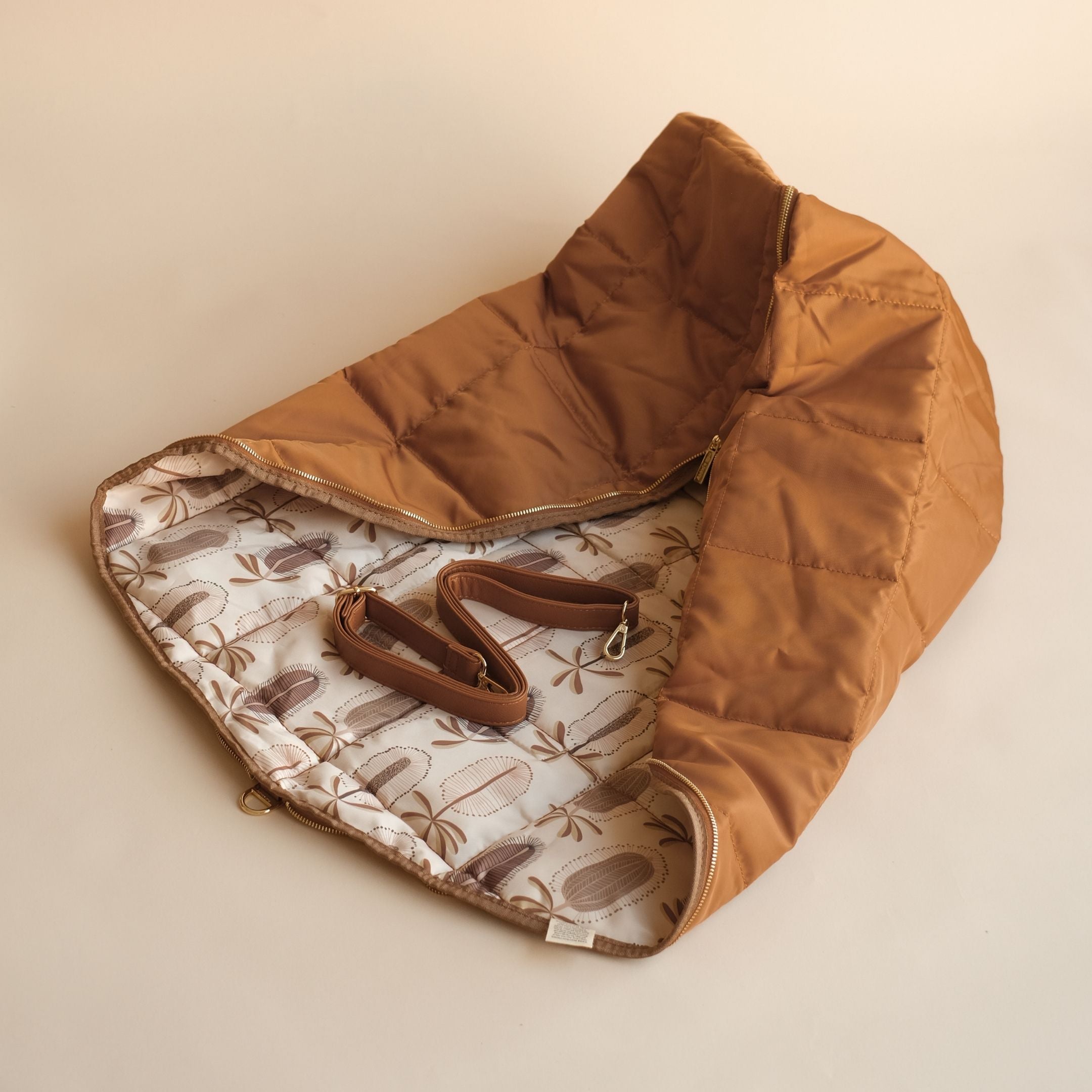Pregnancy To-Do List
A brain dump of everything to think about, plan and do during your pregnancy.
If you’ve just found out you’re pregnant (congrats by the way!), particularly for the first time, you might be kinda wondering: ‘okay, so… now what?’ If you’re anything like me when I fell pregnant with my first, you’re keen to know what’s coming up. The planning is all a part of the excitement. What do you need to mentally and physically prepare for? What do you have to look forward to? Or what things have you feeling a bit anxious?
I’m not the most organised person, but I really wanted an extensive pregnancy to-do list. Not to necessarily do everything on it, but to make sure I was really getting everything I could out of the experience of being pregnant. I never found one, not the one that I really wanted…
So I thought I would make one for you! This is the pregnancy to-do list that I would have loved when pregnant with my babies. Maybe one day I’ll be lucky enough to call upon it myself, but if not, it’s something that I’m hoping will help you on your pregnancy journey.
NOTE: You definitely don’t have to do it all! This is just a list of everything that I could think of that you might like to consider. Some things just won't be for you (some of them weren’t for me either, but I still thought about the option). Just strike them out if it’s not your thing. I’ll often be adding to the list as I think of things as well - please let me know if you can think of something I’ve missed.
P.S. I am located in NSW, Australia and some things might be specific to how appointments etc. are done here - I don’t know. But just thought I’d mention that. Also, I’m not a doctor, midwife, nurse, doula, qualified anything (oh well, not quite true I’m a qualified radiographer and personal trainer [surprise? Haha] but I am not practising or you know… a professional) this list has been created based on my experience and knowledge as a mum of two.
First Trimester
3-5 weeks pregnant
- Pee on a stick and find out that you’re pregnant!
- Book in an appointment with your GP and/or obstetrician (or any other health professionals you need to work with). At this appointment you’re likely to get referrals for a blood test to confirm that you’re pregnant and an ultrasound scan to confirm your dates (how far along you are).
- Get bloods to confirm pregnancy test. Check with your doctor but this is usually done any time ASAP after your appointment with them.
- Take your vitamins and any medication advised by your healthcare professional.
6-9 weeks
- Get your dating ultrasound scan done. Check with your doctor but at 8 weeks estimated this is usually done.
- You’ll probably need to book in another doctors appointment for the dating scan results. At this appointment you will probably receive a referral for a nuchal translucency scan and a blood test that goes with the scan. It is important that this scan is done at the correct time - which your doctor will advise usually based on your dating scan results.
- Book in that scan at the right time as soon as possible!
- You might want a NIPT blood test done - research this option. It checks for genetic conditions and you can also find out the baby’s gender.
- Learn about your pelvic floor and connect with it.
- Look up some pregnancy exercises, workouts and programs.
- Research pregnancy nutrition.
- Check your health insurance cover if you have it and what you are entitled to.
- Book into the care provider(s) of your choice - the earlier the better! You don’t want to miss out on your favourite care providers. If you aren’t happy with your chosen care provider at any stage, ask for a change or look for someone else.
9-10 weeks
- Start researching things like:
- Would you like a doula?
- Would you like a lactation consultant?
- Would you like a private midwife?
- Would you like some professional photos at different stages?
- Would you like to book into some birth classes?
- Would you like to book any postpartum services?
10-12 weeks
- Book an appointment with your doctor for the results of the nuchal translucency scan.
- You will need a referral for a morphology scan at this appointment - usually done at around 20 weeks but your doctor will let you know when to book it for. You may not get this referral from your doctor… your midwife might refer you instead.
- Book that morphology scan asap!
- If you have chosen public hospital, midwife group practice or private midwife care - you will probably have your first appointment with your midwife some time around 12 weeks pregnant. (Hospitals typically will need a copy of all the ultrasound reports and blood test reports that you have had done during this pregnancy in order for you to make an appointment, so this will need to be organised by yourself or your doctor to be sent to the hospital of your choice)
Now that the appointments and scans are over, here are some things that you could/should be incorporating into your first trimester at home yourself. Again none of these are essential if you don't feel up to it, or if it doesn't feel like it suits you.
- You might be feeling pretty sick and awful. Sorry. Do what you need to do to get through! Here’s some ideas:
- Eat bland foods that work with you and don’t freak out if all you can stomach is hot chips and frozen coke. Do what you have to do!
- Stay hydrated, but ordinary water might not taste nice. I found ice cold water easier and also found adding some flavoured cordials helped keep up my water intake.
- Sleep in, go to bed early and nap whenever you want. Some days the only way I could avoid feeling sick was by being asleep as long as possible…
- Ask your doctor for medication options.
- Start asking for help and get confident asking for help. I feel like I’ve often not wanted to bother others or felt like I should be able to do everything alone. This is ridiculous and I think most people could get better at asking for help. Start practising early in pregnancy so you get better and better at it - it really is so important to have support.
- Start learning about and deeply practising self-care now. It is so important to look after yourself.
- Practice meditation.
- Think about how you’d like to announce your pregnancy - to who, when and how?
- Go through your clothes and check that they still fit. See if you might need to get some more bump friendly items going forward and begin planning your pregnancy wardrobe. I highly recommend making sure that any maternity clothes you buy are also breastfeeding friendly.
- Get a pregnancy journal and start documenting your journey into motherhood. Set reminders/alarms to take time regularly to add to your journal.
- On that note, TAKE SOME PHOTOS - this is going to come up in the list multiple times. And I know I sound crazy when you probably don’t feel like you have a “proper bump” yet. But just take the photo. Take hundreds. You won’t regret it!
-
Get your nuchal translucency scan and blood test done. (the blood test will need to be completed a few days before your scan)
*please note this scan is typically recommended to be done no earlier than 12 weeks and no later than 14 but your doctor will advise you on this*
Second Trimester
13-15 weeks
- Often people decide to share their pregnancy announcement at the beginning of the second trimester - you totally don’t have to though, it’s just most common around now. You can share your news whenever you want - maybe never! Completely up to you.
- Some private companies offer gender scans as early as 14 weeks and they can sometimes get some good 3D scans at this stage too.
- Keep taking lots of photos of your bump and writing in your journal.
- You’ll probably have monthly appointments with your midwife at this stage (of course this can be different for different services). What to expect at these appointments:
- Blood pressure checks.
- Fundal height checks.
- Fetal position checks.
- Fetal heart rate and movement checks.
- Mental health checks.
- Discussions about things that can happen and your options during pregnancy, birth and postpartum. Ask alllllll the questions you need! No question is a dumb question.
- Information about caring for a newborn. Again - ask all the questions!
- If you aren’t happy with the care you are receiving, ask for a change. It’s ok to look for a second opinion or a different care provider. You’re not going to get along with everyone but it’s important to set yourself up with a village that you feel comfortable with. And that starts now with your doctors, midwives and other health care professionals
- If you’ve been feeling sick, hopefully that will subside by now. Fingers crossed!
16-18 weeks
- Start singing, chatting, reading to your baby. Take some time each day to connect - however feels right to you. Maybe getting out some lotion/oils and rubbing your belly. Or poking and prodding to see if your little one kicks you right back.
- Chat with your partner about starting their connection with the baby too. Don’t be too worried if they’re not super into chatting to your belly or feeling the baby kick by the way - I’m just mentioning that because my hubby wasn’t that into it… at the time (being hormonal I guess) I was so worried that meant he wouldn’t have a good connection with our baby. He does and he’s an excellent father. Continue to check in with your partner about connecting with your baby though! It might take a bit of encouragement. Just don’t be disheartened if he/she doesn’t connect with your baby the same way you do. Each parent parents differently.
- At around 18 weeks you might start to feel the baby moving. You might actually feel it earlier or sometimes later - but usually between 16-20 weeks you should start to feel
- your baby kicking away in there! The best.
19-22 weeks
- Morphology scan is usually done at around 20 weeks. If you want to find out the baby’s gender you can ask the sonographer to check for you during the scan.
- You’re likely to get a blood test or two during your second trimester.
- You’ll probably do some urine tests as well.
22-25 weeks
- Start learning about labour, going through your options and mapping out your birth.
- Book in some birth classes.
- Start researching baby play, secure attachment and biologically normal sleep.
- If you would like one, start organising your baby shower or asking a friend or family member to host for you.
- You will be offered a glucose tolerance test to be performed between 24-28 weeks to check for gestational diabetes.
- Start writing out a list of things you want/need for yourself for birth and postpartum.
- Start writing out a list of things you want/need for the baby.
- Create a gift registry if you wish - this may feel a bit selfish but it actually makes life so much easier for your friends and family.
25-26 weeks
- REMINDER: self care!
- Book in some things that make you feel good regularly eg. pregnancy massages, dates with your partner, catching up with friends, little getaways, going to the movies…
- Start sorting out work arrangements if necessary.
- Consider getting a birth photographer - I really really wish I had one at my first birth and got one for my second and it’s just the most treasured photos. You don’t have to share them with anyone. Look, it’s not for everyone, but if you’re umming and ahhing about it I would highly recommend it. But photographers will need notice for this one, so communicating and booking in with a photographer is essential. The earlier the better!
Third trimester
27-29 weeks
- Take lots of photos and videos of your bump!
- Keep documenting in your pregnancy journal.
- Self care, I repeat, self care!
- Around this time you can sound out places for tens machine hire, if you are wanting to secure one of those.
- 3D scans are best done between 27-32 weeks, before your baby descends into your pelvis. This is not a medical scan, but can be done and arranged through a private company if you want.
- You’ll probably do a few urine tests throughout the 3rd trimester as well.
- It’s not uncommon to have low iron, you might be offered an infusion.
30-33 weeks
- You may need a 3rd trimester scan to check things like where your placenta is if previously noted that it was close to your cervix for example.
- You’ll probably get another blood test done during the third trimester to check different levels.
- Towards the end of your pregnancy your midwife appointments may become more regular. Like every 2 weeks or so.
- Get a baby book and start filling out the parts that you can.
- Get a memory box to fill with special things from pregnancy, birth, postpartum and newborn stages.
- Create a birth playlist.
- Find a special scent to use during late pregnancy and birth that will become a signature for that time in your life - your sense of smell is closely linked to memory.
- Go out for lots of dates!
- Organise care for your other children during labour/ hospital stay
- Begin washing the first few items that the baby will be using (clothes, blankets etc)
-
Start to buy the item that you will need to take to the hospital with you. (sanitary items, toiletries etc)
See our hospital bag list here
33-36 weeks
- Group B streptococcus test is usually performed late pregnancy - this is a vaginal swab test.
- Really focus on creating your village now - hopefully you’re pretty comfortable asking for help by this stage if you’ve been practising since early pregnancy! Ask for help and accept help when offered. If someone asks if you need anything and you’re stuck for ideas, ask them to make some meals to stock up in your freezer.
- Pack a hospital bag. Click here for an awesome packing guide and hospital bag checklist.
- Start arranging your space if you’re planning to birth at home.
- Get some maternity photos done.
- Meditate.
- Connect with your baby daily.
- I’ve totally mentioned this earlier but seriously get a pregnancy massage (or 10!) - they’re amazing!
- Get a manicure, pedicure and your hair done.
- Go on a “babymoon” getaway.
- Arrange a spot in daycare if you need to.
- Make any arrangements at work you might need to wrap things up if you’re taking leave.
- Prep your kitchen for the newborn phase. Meal prepping and freezing some meals that you can quickly heat up will save you a lot of hunger later on when you have 2 seconds free to yourself.
36-38 weeks
- Communicate your birth preferences to your support people! Ask lots of questions, inform yourself and advocate for yourself.
- Discuss some topics with your partner like:
- How you can divvy up responsibilities 50/50 - who’s going to do what.
- Coping with sleep deprivation.
- Sharing nappy changes and laundry.
- What feeding your baby is going to look like - how they can support that.
- Support people. Make a list with contact details.
- What are each other's boundaries and respecting them.
- How to discuss the hard topics when they surface.
- Baby safety non-negotiables.
- Self care for both of you.
- Mental health - red flags, resources, services and how to bring it up in the best way.
- Education and information - who do you trust to empower and guide you.
- Visitors during hospital stay and the fourth trimester - perhaps make a list of rules and people.
- Allow everything to be subject to change - but make sure you clearly discuss and agree before deciding to make any changes.
- Research postpartum nutrition.
- Discuss with your midwife about antenatal expressing
- Lookup local baby activities that peak your interest.
- Get in touch with some local mothers groups - ask around to meet other mums going through similar stages as you at the same time.
39-40+ weeks
- If you're still pregnant, hang in there. Each day is one day closer to meeting your gorgeous little person. I personally went over 41 weeks both times, and it can suck if you're impatient, but soak up this time as much as possible ! (unless prior arrangements have been made for medical necessities of course)
- Take photos! This is your last chance to document those last few days.
- Document how you’re feeling.
- Write a letter to your partner to read while you’re in labour/early days of postpartum.
- Write a letter to your baby.
- Thats all im putting in this weeks to do list, as this is your time to really rest, do as much or as little self care as you can (energy tends to be very low at this stage)








Leave a comment